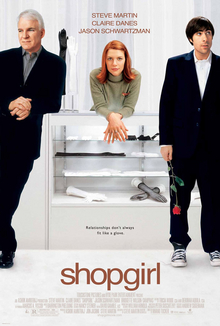Critical response
On the review aggregator website Rotten Tomatoes, the film holds an approval rating of 61% based on 155 reviews, with an average rating of 6.3/10. The website's critics consensus reads, "Shopgirl is precariously slight, but it has some intriguing moments, and Danes is luminous." [4] On Metacritic it has a score of 62 out of 100 based on 37 reviews. [5] Audiences surveyed by CinemaScore gave the film a grade "B−" on scale of A to F. [6]
Roger Ebert gave the film 3.5 out of 4 stars. [7]
In his review for The New York Times , A. O. Scott called the film "elegant and exquisitely tailored ... both funny and sweetly sad" and added, "[It] is a resolutely small movie, finely made and perhaps a bit fragile. Under the pressure of too much thought, it might buckle and splinter; the characters might look flimsy, their comings and goings too neatly engineered, their lovability assumed rather than proven. And it's true that none of them are perfect. From where I sit, though, the film they inhabit comes pretty close." [2]
Mick LaSalle of the San Francisco Chronicle described it as "a film of wisdom, emotional subtlety and power ... directed with a rare combination of delicacy and decisiveness." [8]
In Variety , Joe Leydon observed, "Martin hits all the right notes while subtly conveying both the appealing sophistication and the purposeful reserve of Ray. But he cannot entirely avoid being overshadowed by Danes' endearingly vulnerable, emotionally multifaceted and fearlessly open performance. (In a few scenes, she appears so achingly luminescent it's almost heartbreaking to watch her.) The two stars bring out the very best in each other, particularly in a poignant final scene." [9]
Carina Chocano of the Los Angeles Times said the film is "like Pygmalion for the upper-middle-brow business class flier. Which isn't to say it's bad. On the contrary, it's smart, spare, elegant and understated ... Danes can fill a scene with one wounded glance, and her body language alone conveys a richness of character that makes an otherwise not very expressive character mesmerizing." [10]
In Rolling Stone , Peter Travers rated it three out of four stars and commented, "The May–December thing worked in Lost in Translation and it works here, thanks to the perceptive and gracefully romantic script that Martin has adapted from his novella. This is not the wild-and-crazy Martin of Bringing Down the House , this is the Martin who writes for The New Yorker with erudition and wit." [11]
Steve Persall of the St. Petersburg Times graded the film C and called it "too slight to be considered a movie yet padded enough to pose as a feature-length work ... The blessing and curse of cinema is its ability to compress ideas into simple images. When the ideas are this simple, cinema crushes them to dullness. Mirabelle's unremarkable life simply doesn't deserve big screen treatment. Any author other than a Hollywood favorite like Martin likely wouldn't get it done." [12]
In New York , Ken Tucker stated, "The challenge of the movie consists of making you believe that these two people, separated by age and status, could fall in love. Shopgirl succeeds in this with a confidence so sure and serene that you feel through much of the movie as though you’re listening to a fairy tale, an effect enhanced by the voice-over narration provided in soothing tones by Martin-as-Ray." [13]
Susan Wloszczyna of USA Today said, "A serene luminescence surrounds Claire Danes [who]—reduced of late to action drivel ( Terminator 3 ) or bit roles ( The Hours )—finally fulfills the potent promise of her mid-90s TV series My So-Called Life . Los Angeles doesn't look half-bad, either. When director Anand Tucker isn't training his camera on the jewel-like traffic lights below or the sparkling cosmos above, he portrays the City of Angels as a haven of spare elegance and urbane stylishness, as if it were Woody Allen's Manhattan but with better weather and inviting outdoor pools. But save for savoring Danes and an L.A. cleansed of gaudy excess, there is little that is truly novel about Shopgirl ... The film ultimately lets Mirabelle down and leaves the viewer dissatisfied. A Lost in Translation drained of its wryly observed humor, Shopgirl is worth a browse. But it isn't always easy to buy." [14]
